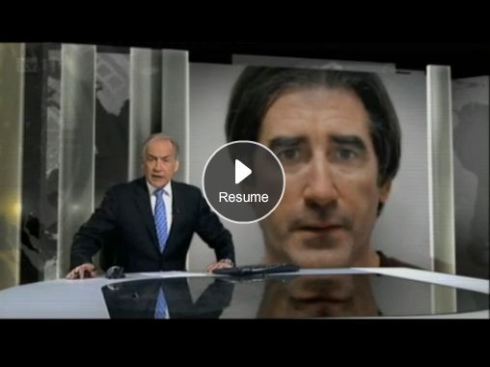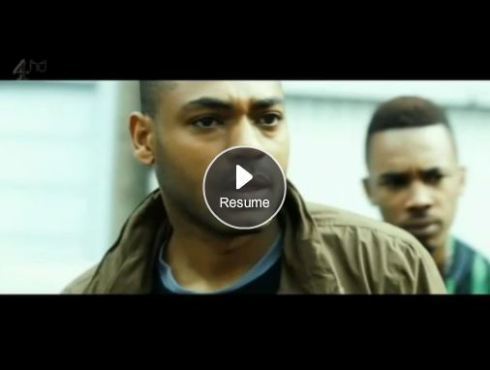Andrew Collins's Blog, page 46
November 18, 2011
Do you expect me to talk?
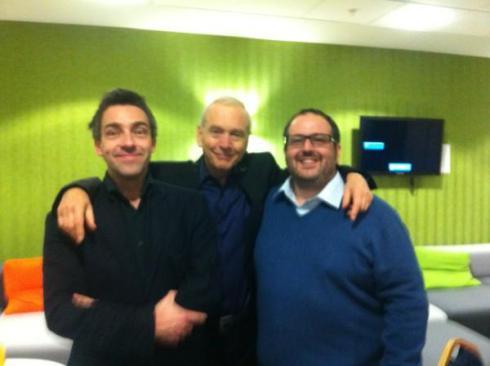
This will not be a long entry about Celebrity Mastermind, which I filmed at MediaCity, Salford Quays, in Manchester, on Tuesday. I am under strict orders not to reveal anything about the show, for self-evident reasons. I have not even told my Mum and Dad how I got on, other than to say, it was fine. That's all I will say. Having done this most surreal thing, what can I safely tell you? Well … they film four editions in a day, over three days, which is quite an endurance test for host John Humphrys and the producers, directors, floor managers, technicians, runners and caterers, not to mention the audiences who I assume sit there for the whole day, too. Because it's shot in Manchester, it's acting as a canary down the coalmine of the BBC's financially-driven migration north, as are Blue Peter, CBeebies, 5 Live and various other TV and radio shows, including 6 Music's Manc outposts, Radcliffe, Maconie and Riley, who only moved in this week.
MediaCity is vast, custom-built and labyrinthine, but then so was Television Centre. It's clean, slick, digitised and freshly painted and thus has zero character – it's more like the backstage part of a large arena venue – but it seems to work. Though the celebrities who take part very much occupy the full spectrum of "celebrity" – starting at me and Escape To The Country presenter Jules Hudson, and rising to the dizzier heights of, say, Jason Manford, Erin Boag, Sandie Shaw and cricketer Michael Vaughan OBE – all are treated equally. In this respect, it was fun for me to travel First Class to Manchester (not that I was truly able to relax and enjoy the journey as I was wracked with self-doubt and nerves), and to have a dressing room, and be escorted about the building by designated young men and women in headsets. When I met my fellow contestants – won't spoil it by naming them, you'll find out soon enough – I was fully aware that they probably didn't know who I was, but that I knew who they were. This is fine. In many ways, Mastermind is a great leveller. You don't score points for how many times you are recognised.
Here's the weird thing. I was so nervous about the whole thing in the days leading up to Tuesday, and terrified when I woke up on the day. But once I arrived at Manchester Piccadilly and found my cab, the nerves started to dissipate. I think this was something to do with the inevitability of my fate as it got nearer. There was really no more time to revise. I had done all that I could. I had been using quiz books to "revise" general knowledge, and once I put my final quiz book in my bag around Macclesfield, I knew that I would not be needing it again. I liken the whole experience to my fear of flying. I don't like flying, and yet I have flown a lot. What happens is: I get nervous and uneasy in the days leading up to a flight, and feel a bit sick when I wake up in the morning, but the closer I get to flying, the less nervous I become. Thus, my nerves dissipate when I travel to the airport, when I check in, when I go to the gate, and finally, when I board the plane, by which time, I am no longer nervous.
As we were introduced to the audience by warm-up man Ted Robbins and trooped to our seats (I was placed third from the left), I realised that there was no escape. It was happening. I was going to sit in one black leather chair and eventually be directed to sit in another one, there to be asked questions on my specialist subject for a minute and a half, and subsequently on general knowledge for two minutes. (I liked the fact that the two rounds were referred to by the production team as "SS" and "GK".) Like all TV studios, especially ones you are used to seeing on TV, the real thing is oddly unimpressive and commonplace. I remember thinking this when I went to a studio recording of Have I Got News For You – the set looks like the pieces of wood it is actually made from, as opposed to being made of TV magic, which is what we expect. TV Burp is the same. With re-takes and pick-ups, Mastermind is no less real, but the one thing that isn't faked is the answering of the questions: these take place in real time, by and large, and the buzzer actually sounds at the end. The main difference between watching it and being on it is that you are on it.
It was a treat to be recording on the same day as Justin Moorhouse, whom I haven't seen since we lived together in Edinburgh last year. He kindly put me up for the night in his house, too, which meant I could hang around afterwards in hospitality and eat what amounted to three lots of catering, one after each show. It was only at the end of the day that John Humphrys turned up backstage, all relaxed and without a tie, to have a couple of cans of bitter. So we nabbed him for a photograph. I'm glad we did. Although, frankly, there will be enough visual evidence that I was on Mastermind in December. I'm such a star-struck passenger, I took the little insert from my dressing room door. More proof that this ridiculous thing actually happened to me. Now time to move on with my life.
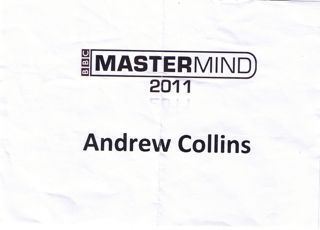








November 14, 2011
Solid as a rock
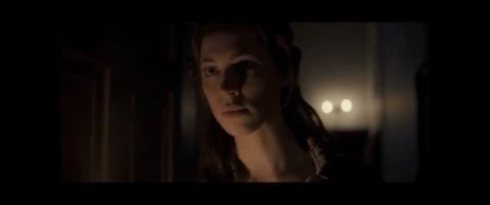
Not every film can be a modern classic. Not every film can be four or five stars. Not every film can be Casablanca or Rashomon or The Conversation. Some films are "solid" three star films and that's fine. I've seen two at the cinema in the past two weeks. It really is fine.
You know exactly what I mean when I say three stars. (When, a lifetime ago, I performed a one-man show at the Edinburgh Fringe, I got a number of "solid" three star reviews. This, for me, was fine.) I notice that the Sunday Times' Culture section has recently, without notification or fanfare, dropped the star ratings from its LP reviews. Not from its film reviews, by the way, just from the LPs. I have no idea why, but it's very brave; it forces you to read the reviews, or else you will never be able to divine what, say, Stewart Lee thinks of the new Fall LP. It's amazing how refreshing and at the same time disconcerting it is. (I've always loved Word magazine for eschewing this celestial shorthand since day one. Long may they stick to their stubborn guns.)
I only bother mentioning these two three-star films – The Awakening and The Ides Of March – because we all exist under the tyrannical yoke of the star rating system. We're always impressing upon writers at Radio Times that a three-star film – a "solid" three-star film! – is, by definition, "good." (It literally means that if you check the ratings definitions.) But if, as a reviewer, you liked something, it's tempting to push a solid three up to a more declamatory four, in order to underline your approval. A three, though, is surprisingly adequate.
I enjoyed The Awakening, and I enjoyed The Ides Of March, but neither tipped the three-star barrier. Not a problem.
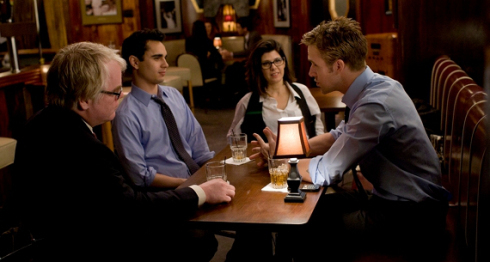
Both were showing at the Curzon, which is an arthouse chain and picks and chooses carefully with a bias towards smaller films, more esoteric films, and foreign films, so I take its choices as a rough guide to a film's quality. The Awakening is basically an English period ghost story made by BBC Films. Rebecca Hall, whose elegant and willowy presence seems, too, to act as a guide to quality – and may well have sealed the film's fate as worthy of arthouse consideration – plays a rationalist who makes her living exposing fake spiritualists in the painful years after World War I, but has deeper psychological problems herself, exposed when she is assigned to find out how a dead boy is haunting a boarding school, when, of course, ghosts do not exist.
Directed by Nick Murphy (TV's Occupation), and co-written with Stephen Volk (TV's Afterlife), it's well shot, and effectively plotted, and some of the shocks are cleverly achieved, with a lot of suspense created through silence and stillness. Also, nice to see a film that's designed to scare, but not repulse with gore and violence. I felt the plot unravelled towards the climax, and the heroine's rationalism was never going to escape unscathed, but it was … solid. Take out two briefly glimpsed bits of nudity and it could be shown on BBC1, early evening, on a Sunday, and lose little of its impact.
I expected a lot more from The Ides Of March, for self-evident reasons: the cast, the subject matter, and the director. My love of George Clooney is well known. Also, my love of Ryan Gosling. And my love of American politics as a suitable subject for drama. With Clooney directing, co-writing with Grant Heslov and source playwright Beau Willimon, and playing the part of a flawed Democrat candidate on the campaign trail, with Gosling and the great Philip Seymour Hoffman as his advisers, and Paul Giamatti as their opposite number over at Clooney's rival's office, how could this film not be a four- or five-star film?
Well, it's powerful, it's clever, it's subtly acted, and although it's not Sorkin or Mamet, it aspires to that level of smart-talking confidence and jargonese, and feels like a play in that sense. But you can see the plot twists coming, and at the end of the day, it's no more than another star-spangled, high-powered slice of modern US politics for the kind of people who – like me! – are junkies for that kind of thing. It lacks the wit, speed and unashamed melodrama of a prime episode of The West Wing, or the surprise and ingenuity of Bulworth (on which Sorkin worked), or even Primary Colors [sic], neither of which felt as fond of themselves as The Ides Of March. It's certainly no satire, like Bob Roberts or Wag The Dog. Far more po-faced than those.
Hey, put man-of-the-moment Gosling in anything – a breakfast cereal commercial – and it will seem instantly cooler than it is. I'd vote for him. Equally, who better to play a smooth Democrat candidate than Clooney? It's the 21st century equivalent of Redford playing the Democrat candidate in The Candidate. As such, The Ides Of March is not going to waste anybody's time. It's fine. It's a decent story, well told, with enough moments of highwire dialogue to remind you you're not watching rubbish. But a three-star movie it is. Which, as I believe I have established, is not necessarily a problem.








November 12, 2011
The height of cruelty?
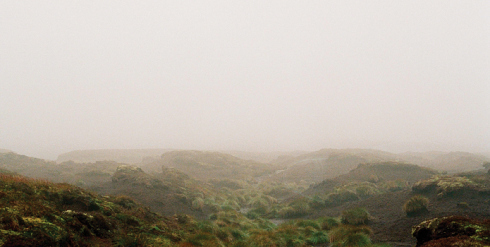
As mentioned previously, I have a problem with Wuthering Heights, Andrea Arnold's stunningly elemental interpretation of Emily Brontë's famous novel, and that's with the implied animal cruelty in it. It's set on the wild and windy moors, of course, and through Arnold's radical and beautiful vision, we almost literally have our noses rubbed in the mud of this unforgiving rural landscape. By use of shallow focus and forensically sharp digital stock, she takes us right down into the undergrowth, there to see dewdrops glistening on a single strand of a spider's web, or a thread of sheep's wool snagged on a thistle. We can almost smell a horse's breath, or feel the hairs on its head. It's thrilling filmmaking, and a piece of cinema I would recommend you see, despite its narrative deficiencies. Unless you have a problem with the implied mistreatment of animals.
Using a largely unknown, and inexperienced, young cast, Arnold imbues what is for many a familiar love story with new life. (I have never read the book, but I've seen it on TV and heard the hit single.) She and her screenwriter Olivia Hetreed make Heathcliff black, rather than a gypsy, which brings a new power to his relationship with Cathy. As I note in my much shorter Radio Times review of the film, the detailed sound design, lack of score and action-chasing handheld camera bring the story alive. And Shannon Beer and Solomon Glave are striking as the young Cathy and Heathcliff. It's such a modernist approach, almost as if this version is a guerilla documentary about a more conventional dramatisation of Wuthering Heights, captured on the hoof for the second disc of the DVD, your suspension of disbelief is occasionally shattered and, ironically, you start to think: it's some actors on a hill. Indeed, it's the reality of it that gives me my Big Problem.
The film carries a 15 certificate, which, according to the detailed BBFC report, is mainly to do with the strong language – which is only moderately fruity albeit at one point racist to modern ears – and what it refers to as "animal killings." This is what the report goes on to state: "There are four scenes involving live animals, with a sheep's throat being cut, a rabbit's neck being broken and two dogs seen hanging from their collars from a fence and a branch, implying that they are left to die. Assurances have been provided by the production company explaining in detail how these scenes were filmed, including detail of special effects employed, so as not to harm any of the animals involved."
I have to take that at face value. I don't know how they used special effects to make it look like two dogs were being hung on a gatepost and a branch, but it looks just like they are actual dogs being actually hung, for a few seconds, by their collars, and are left, for a few seconds, to wriggle around uncomfortably. It's easy enough to imagine animal trainers rushing in to unhook them after being on film for a few seconds, but that can't be the case, surely? To be honest, as I never tire of saying, even implied violence towards animals onscreen bothers me. In a week when one prize fucking idiot was caught on camera actually swinging a cat around by its tail, and another was apparently stolen after being featured in an article in the London Evening Standard, I worry about people. And if animal cruelty is shown, even in an arthouse film, it might subconsciously go in.
I'm going to trust Andrea Arnold and the BBFC and accept that, somehow or other, no dogs were even made uncomfortable for a few seconds in the making of this film. But if you're as soppy as I am, you might want to be ready to look away, or stay away.








One summoner's tale
I'm not one of those critics who thrives on tearing something to pieces. And I'm especially sensitive to other writers, as I know how difficult and pressurised it is to write for TV, and the compromises you have to make in that job. But I cannot pretend that ITV1′s five-nighter The Jury, which I review this week in my Guardian Telly Addict round-up, didn't horribly disappoint me. I prefer to celebrate the best telly, rather than prod the worst, and indeed, give the stuff I wouldn't normally watch a fair and objective chance … I trust, if you've been watching, that you would agree with this general assessment of what I do. But because The Jury, a high-profile piece of TV real estate, was written by a proven genius of populist TV drama, Peter Morgan, I feel it's only right to express my disappointment. At least I can back my feelings up with clips, which I do. You can watch Telly Addict here. I also pass armchair judgement on American Horror Story on FX and Life's Too Short on BBC2.
I'm not going to get a job reviewing telly for an actual newspaper – such as, I don't know, the Guardian – by liking everything, or giving everything a fair crack of the whip, but I never did set out to be Charlie Brooker, who does the opposite with such panache, originality and sincere bile; I set out to be me, watching telly, in my living room, and then saying what I thought of it. (Incidentally, the estimable John Crace, who reviewed Life's Too Short in the actual newspaper – and not from the bottom of a bin behind a filing cabinet down a long corridor at the back of the Guardian website – was much harder on it, and eloquent, too. His review is here. I am such a team player.)
Oh, and I'll be reviewing the excellent Rev next week.








November 11, 2011
I'm a celebrity … ?
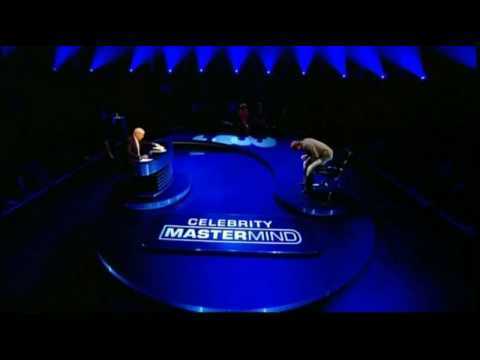
I expect you've gathered that I have been asked to compete on the next series of Celebrity Mastermind, which is filmed in Manchester next week for broadcast on BBC1 over Christmas and New Year. It goes without saying that I am flattered to be asked, and excited, and terrified. I have known for three weeks and have been mainlining quiz books ever since. (Even though you can't actually revise general knowledge – it is, after all, about everything – I have found that testing myself has been good exercise for my brain and it has unlocked quite a bit of knowledge that's already in there. Also, it's good fun.) I have been forbidden from revealing my specialist subject, for the simple reason that if anybody helpfully asks me a question on it in a public forum, that question will then be disqualified for use on the programme. (I seem to remember running into this grey area with Richard last year on 6 Music, when listeners helpfully sent in test questions on Rasputin, unless I'm getting the chronology of it wrong?) Anyway, after Tuesday, when I spend the day in Salford Quays, I'll at least be able to reveal what many have already guessed, although not how I got on, obviously. I shall abide by Mastermind's official secrets act until it's broadcast.
Here's what's really weird about what is already a surreal situation. I've always felt at one remove from the sort of people they get on Celebrity Mastermind – or indeed, Celebrity Anything. Quite a few people I know have been on Mastermind – Richard, Stuart Maconie, Stewart Lee, Lucy Porter, Rhys Thomas, Giles Coren – but I consider all of them to be more "famous" than me. Stuart's an established name on Radio 2, and it doesn't get much more mainstream and housewives' favourite than that, while the others are on television regularly. (Despite Richard's forelock-tugging humility shtick, I consider his having been a panelist on Have I Got News For You and Never Mind The Buzzcocks the equivalent of making it. I'm not sure being a panelist on What The Dickens? on SkyArts is.)
I don't feel insecure about not being famous. I get stopped in the street about just as often as I can handle, and many of those occasions are for Mark Steel anyway. What I'm insecure about is the already generous net of "Celebrity" finally widening to include me. It seems they really are starting to run out of actual celebrities. It was bound to happen. Richard enjoys telling of the time he was described in Cheddar as "nationally known." I am happy to be "known" – most of my work happens in the public domain, albeit as a writer, I feel more comfortable than I do as a performer or broadcaster. Radio is a much more subtle and intimate form of communication than being on the telly. So it's ironic that Celebrity Mastermind will put me on early-evening BBC1. (If my early experience of Telly Addicts - another early evening BBC1 quiz show – was anything to go by, it might actually get me recognised in the street afterwards.) "Celebrity" is not a profession; it is a condition, and a condition that is conferred upon you. If the word has its roots in "celebration", that no longer holds true; many of today's "celebrities" are anything but celebrated. Cat Bin Lady was, briefly, a celebrity. So is Louise Mensch.
Again, I am sworn to secrecy, but I have been told the identities of the three co-participants I will be up against on the day, and they are all recognisably famous. Your mum and dad would know who they are, to look at, if not in all three cases, actually name. If they are still alive, even your grandparents would know them. This is not a given; I have not known everybody who competed on the previous eight series of Celebrity Mastermind – if they were presenters of TV shows that I don't watch, I didn't necessarily recognise them, or their names. I will be that person on the night. I will be the one whose face and name leave many viewers clueless. Let's face it, I am now part of the problem. By being on a programme with Celebrity in the title, I am adding to the desecration and belittlement of the word. Journalists love to describe people like me as "Z-list" although this is ironic, as journalists are just as likely to be asked to be on TV, where only hardened newshounds will recognise them from their picture bylines.
When I was growing up, if I didn't recognise somebody on Celebrity Squares, I assumed it was because I was too young. I accepted without question that they were celebrities, because it said so in the title of the show. By that same token, by being on Celebrity Mastermind, I will appear to be a celebrity. Just as, say, Pixie McKenna, James Redmond, Hilary Kay and others I did not personally recognise did on the last series. (I found out who all three of these people were when their captions came up, of course: TV doctor, actor, Antiques Roadshow.)
I'm really thrilled to be on it, but because it's Mastermind, and it gauges and rewards cleverness, not fame, and I've watched it all my life, and I want to do well (not win, just do well enough not to look like an idiot). I'm also excited to be able to make some money for – and give much-needed primetime publicity to – the charity of which I'm patron, Thomas's Fund. I like quizzes. I like my own specialist subject. I like playing Mastermind at home. The C-word is the only fly in the ointment. And only a semantic fly in any case.
The car firm that is being sent to pick me up from Piccadilly Station on Tuesday is called Star In A Car. What if they operate on the basis that if you are a star, the driver will recognise you and pick you up? If mine doesn't – and unless he records and keeps every edition of What The Dickens? on SkyArts, or he watches 6 Music on the webcam when one of the regular daytime presenters is ill, he seriously might not – I may have to pay for my own cab to the studio.
Right, back to my revision.








November 5, 2011
Top telly
This week's Telly Addict, over on the Guardian website, is overcome by unplanned gloom this week, with all three programmes under review set on the wrong side of the tracks and reflecting the seamier side of life. Sorry. It just happened. Top Boy, which ran from Monday to Thursday on C4, is set on a fictional Hackney estate where drug-dealing and internecine warfare is rife; Misfits, back for its third series on E4, is a sci-fi comedy that's also set on an estate, this time the unnamed Thamesmead in Bexley/Greenwich, and revolves around young offenders on community service; and Braquo, a thrillilng new French cop import on FX, which I've already written about, is set in the underbelly of Paris, where violence on both sides of the law is a way of life. As is drinking at work.
It's all pretty gritty. But vital in many other ways. I loved Top Boy, written by Ronan Bennett and superbly directed by Yann Demange, although why it was force-fed to us in four days I don't know. Is this new concertinaed scheduling orthodoxy a reaction to DVD box-set bingeing? If so, I can see the logic, but it does mean that a drama as important and impressive as this feels as if it's being rush-released, and that the channel that's showing it has no confidence that an audience will stick around for it given a whole week between episodes in which to lose interest. Do we have such short attention spans?
This week's Telly Addict comes with a warning again: this video contains scenes of nudity and language that some viewers may find offensive. Brilliant.








November 4, 2011
24






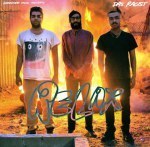






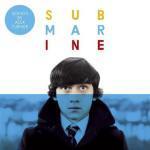
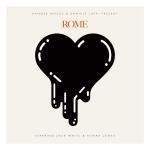

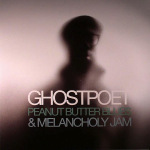
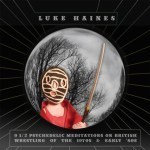

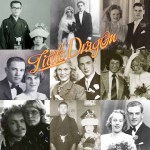




Well, what a turn-up. Recent experience at this time of year tells me that I am either losing patience with new music, or else new music is getting less and less essential, particularly in long-playing form. I usually struggle to come up with a meaningful Top 10 albums at the end of the year, as you'll see from previous year-end roundups. Individual songs, yes, but not full albums, which have come to disappoint me more often than thrill me this century.
Not this year. It's only November, and I'm only gathering contenders together at this point, but look at how many albums of 2011 I'd call brilliant. I won't even list them all yet, but I've counted 24 so far. In any other year, I'd be grateful for a substandard Radiohead album to make the numbers, but King Of Limbs, which I must have listened to about three times since it came out in February, doesn't even make the longlist. As for Arctic Monkeys, not this year.
I put a call out on Twitter for music of black origin, ie. hip-hop, earlier this week and thanks to your recommendations – and Spotify – Death Grips and Das Racist are the most recent additions to the runners and rider. I am only really just discovering their albums, Ex Military and Relax, but I love them already.
Still plenty of time, but if you think I've missed something, by all means give it a shout-out, as they say. (Oh, and I should thank Josie Long for her positive influence on my appetite for forlorn-looking indie music, an almost random selection of which I now force myself to listen to on a weekly basis; thus far, it's mostly given me individual tracks to love, such as singles by Fireworks Night, Rob St John and Ian Humberstone, but Jonnie Common is a great example of an artist I might never have listened to a year ago, and whose exquisite Deskjob album I have come to adore. Lymes are another example of the potential riches of the tiny label netherworld.)
Without planning it, I seem to have a lot of Mercury nominees in here, too. I will never again dismiss the Mercury prize. They clearly got something right this year.








November 2, 2011
The same boat

Here is a poster for Jack Goes Boating. It's the directorial debut of Philip Seymour Hoffman. He's also in it. He was in the off-Broadway stage play it's adapted from, and he directed that, too. The film is kinda off-Broadway. It is proud to say that it comes from "the producers of Little Miss Sunshine," which was one of those breakout indie hits that's become a benchmark by which all potential breakout indie hits must now be measured. Like Little Miss Sunshine, Jack Goes Boating comes ready-stamped with those laurels that tell us it won something at Sundance. Happily, they give out a lot of prizes, and a lot of laurels, at Sundance – to the degree that you must now feel like a right loser to come away without an award for your film. Little Miss Sunshine was bought by Fox Searchlight for $10 million – which is a lot for a small film, but car park change to a big studio – and turned into a smash hit that went on to get four Oscar nominations. There is a fine tradition of indie films going overground, with the help of one the big studios' boutique arms, and this is why Sundance laurels count, and why, presumably, indie films now follow a fairly strict pattern. In music, "indie" started out as a financial and ideological standpoint and turned into a sound. This has now happened in cinema. Which is why all the indie movie posters look the same. Here are some of them.


 [image error]
[image error]


On points, these are the kind of American films I usually like. Their posters show ordinary people sitting or standing. Usually shot side-on. We see the ground beneath their feet, because, it implies, they are grounded; they are real; they are not Hollywood action heroes; they are not mythic. In the posters, whether the people in them are photographed, or drawn, they usually sit or stand in front of a block of colour. This gives them the appearance of being in a cool graphic novel. In the case of Ghost World, this was literal: they had come from a cool graphic novel; in The Savages, and prior to that in Happiness, they hadn't, but were drawn to look like they had. The poster for Happiness was drawn by Daniel Clowes, who created Ghost World. The poster for The Savages was drawn by Chris Ware, who created Jimmy Corrigan.
If we already feel like we're dipping a toe into the shallow waters of in-breeding, let us consider Philip Seymour Hoffman, one of the kings and kingmakers of US indie cinema. He was in Happiness, and The Savages. He cast Tom McCarthy in Jack Goes Boating; McCarthy also wrote and directed Win Win, which came out earlier this year, through Fox Searchlight, having premiered at Sundance, and it starred Amy Ryan, who's also in Jack Goes Boating. (McCarthy's first film, The Station Agent, won an award at Sundance.) The producers of Little Miss Sunshine also produced Sunshine Cleaning, which premiered at Sundance and was nominated for an award at Sundance, and even had the word "Sunshine" in the title. (It also co-starred Alan Arkin, who was nominated for an Oscar for Little Miss Sunshine.) Yes, it's a cosy world.
Jack Goes Boating, released on Friday, is fine. Hoffman plays a pasty-faced, overweight, socially and sexually awkward, lovelorn limo driver in New York, who negotiates a tricky courtship with Ryan's socially and sexually awkward telesales person. Because she dreams of going boating when the winter thaws (she needs to thaw, sexually, too, of course), Hoffman's character must learn to swim in the interim, in order to fulfill her very achievable dream, which gives the film plenty of opportunities for melancholy shots of Hoffman, all pasty and overweight and wet, in his little goggles, in a swimming pool. Being in swimming pools has been a metaphor for people feeling out of their depth because they don't fit in since The Graduate, which was released at the height of the counterculture that, in many ways, gave birth to the modern spirit of indie. (He is also shot looking forlorn and sad among smiley-face balloons in a greetings card shop, and forlorn and sad before a wall of colouring packaging in a supermarket.)
The performances in Jack Goes Boating are good, and the music is sweet (Grizzly Bear, Fleet Foxes – whaddya know?), but it is just me, or have we seen all this before? This kind of film – the earnest, quirky drama that gnaws at the basic sadness at the heart of modern life – is becoming as formulaic as a Hollywood action thriller. It ticks just as many boxes. The only real difference between this and all the other modern indie movies I've mentioned, is that it's actually set in the city and not the repressed suburbs, or somewhere remote and apparently backward, like Omaha, Nebraska in About Schmidt (another one with a poster featuring a man looking straight into the camera against a flat colour background), or Albuquerque, New Mexico in Little Miss Sunshine, or somewhere in Wisconsin in Lars And The Real Girl (and again).


As I say, I'm a sucker for these films. Looking at all these posters that are the same makes me warm inside. It is because of people like me that American indie cinema thrives. It makes the films, it premieres them at Sundance and wins some laurels, it designs the posters to look the same and it gets them to a cinema near me so that I can go and see them. They appeal to me on a basic level as I, too, believe there to be an essential sadness at the heart of modern life, and prefer to see ordinary people in fiction than mythic heroes. But I wonder if we're running out of steam? And if so, will that simply make more Americans make more films about the essential lack of steam at the heart of modern life?
This has not really been a review of Jack Goes Boating. I reviewed it with John Wilson on Front Row on Radio 4 on Monday, so you can still listen to it for a few days, if you'd like. (It starts at 18.22.)
 [image error]
[image error]
[image error]
[image error]
 [image error]
[image error]



October 31, 2011
Control
[image error]

It's not often that I agree with Jeremy Clarkson. Actually, it's absolutely never that I agree with Jeremy Clarkson. But he called the feature-length documentary Senna "unmissable" and his quote made all the posters, for self-evident reasons. It is unmissable. It's one of two films I missed at the cinema that I've recently caught up with. The other is Anton Corbijn's The American. (Both of these films came to my local Curzon – one at the end of last year, the other this summer – but I managed to miss them both.) Senna, first:
I couldn't be less interested in Formula 1 motor racing. But a love for, or even knowledge of, the sport is not a prerequisite, it turns out. Director Asif Kapadia and writer Manish Pandey have memorialised Ayrton Senna the reckless Brazilian motor racing champ by assembling what would be the last ten years of his life from footage at various Grand Prix (is that plural of Grand Prix?), up to and including the one in which he was killed in 1994, San Marino, aged just 34. New interviews with key associates and friends paint a post mortem picture of the man, but it's the way the film builds to its inevitable climax using existing material – coverage from various TV networks, plus in-car footage that may not have been seen before, which puts you right there on the track – that is its masterstroke. I knew he died in a crash, but I didn't know which year it was, or which Grand Prix, so the tension for me ought to have been multiplied – but so persuasive is the dramatic momentum that you can smell his final crash approaching long before it happens. Even though it's a true story – and seems to be a fair and accurate portrait of the man, his moods, his passions, his rebellious streak, his near-death wish and his childish and nihilistic rivalry with Alain Prost – it has all the elements of a fictional tragedy, not least the portents of doom that come with technical developments to the Williams car that made it a death-trap waiting to happen, or so it seemed to a novice like me. I was taught in O-Level English Literature that a tragedy always involved a protagonist who had a flaw; that certainly applies to Senna, if believing oneself to be immortal is a flaw in motor racing.
Documentaries are often bogged down with dramatic reconstruction, and facile melodrama underscored by music, but Senna does it all so organically, and that old phrase "found footage" takes on a new power. There's no doubt that the retrospective testimony helps to shed light on the story from beyond the grave – not least that of the chief F1 medic, who clearly grew weary of having to treat Senna so regularly and at one point offered to retire with him and go fishing – but, thanks to the nature of the sport, the evidence is already on film.
Oh, and no, it didn't make me want to watch Formula 1. Or Formula 2. Or any of the other Formulas.
The American is rock photographer's Anton Cobihn's follow-up to the widely and justifiably lauded Control, which was a personal project for him, and very much from within his comfort zone, to borrow a phrase from Masterchef. In it, he effectively animated his own black and white photographs of Joy Division, but proved himself an adept handler of actors and performances across a much wider canvas than the one he is used to: either the short form video, or the paper he lifts, dripping, from plastic trays in a dark room. Here, he takes a novel as his source, adapted for the screen in a very spare, often wordless way, by Rowan Joffe, and takes us to the stunning Abruzzo mountains of Italy, for what he has turned into his contemporary tribute to spaghetti Westerns. (I am not clever for spotting this: Once Upon A Time In The West plays on a TV in a cafe; the proprietor even identifies it as the work of Sergio Leone, in case we were in any doubt.)
George Clooney, looking all serious and grey (but still well buff for an old man, of course), is a gun for hire who is ordered to go and lay low in a remote Italian town and await instructions. He poses as a photographer, although an old priest he befriends (Paolo Bonacelli) quickly sees through that, and can't stop himself falling in love with a local prostitute (Violante Placido), despite the danger such a break from cover might engender. There is a lot of stuff with guns – Clooney has to design and build a special rifle and is often seen sitting at his modest kitchen table polishing and filing and clicking bits of metal together (more of a mechanic than an artist, as the priest sagely observes) – but although it's essentially a thriller, it's far more of an existential piece. Paul Schrader was talking on the most recent episode of Mark C0usins' Story Of Film about his interest in Camus and Sartre, and how they fed into Taxi Driver and American Gigolo, and I, for one, lamented the loss of this kind of creative impetus in English-speaking film. However, Joffe and Corbijn have dared to pull back from conventional action set-pieces – although there are plenty of these in Castel del Monte's narrow streets and steps – and allow the drama to unfold inside the main character's head. Clooney, a handsome man, let's not deny it, looks great as he sits silently in cafes, and he smiles even less than he speaks, but in this setting, we are invited to imagine his internal dialogue. He seems haunted. We have seen him, in a epilogue, at work as a ruthless and cold killer, but we know there beats a heart inside his breast.
I must admit, I adored The American – and for once, it wasn't just because of my boyfriend Clooney. Corbijn once again brings the beautiful composition and Hopper-like simplicity of his own bold and sweeping photographs alive, but aside from hints of his videos for U2 and Depeche Mode (especially in the red-lit brothel, in which I half expected to see Adam Clayton dressed as a woman with a big feather boa around his neck), this was a brand new set of prints. A surreal, fixed, bird's-eye shot of a winding road and Clooney's car going along it is especially effective. And some of the colour-coded lighting around the narrow streets and tunnels is brilliantly theatrical.
This is a film about individuals lost in the landscape, searching for meaning in a potentially meaningless world. Clooney has no God, and at one key juncture elicits a confession from the priest while vouchsafing his own secrets and sins. In Castel del Monte he is surrounded by the blood ritual and enduring smalltown faith of Catholicism, while his work is clinical and secular and violent, and leaves him with no base, no roots, no history. Schrader – brought up a strict Calvinist – injected Catholicism into much of his best work, and seems still to be wracked with existential doubt. This is where the interesting stories often arise.
[image error]


 [image error]
[image error]
[image error]
[image error]


October 29, 2011
Queen of everything
[image error]
Never mind the European debt crisis, or Syrians being shot in the street by their own government, the big news this week is a constitutional change in this country. What has been called "the biggest shakeup in the rules of royal succession in centuries", ratified by the leaders of the 16 Commonwealth nations where the Queen serves as head of state, means that an elder daughter of the Duke and Duchess of Cambridge would become Queen if they give birth to, as David Cameron put it, "a little girl", whereas before, any masculine children born after this "little girl" would have leapfrogged their big sister to the throne, due to institutionalised sexism built in for 400 years. To which the natural response must surely be: WHO GIVES A MONKEY'S? I mean, we're all feminists, right, but this is equality within a sphere of much more serious inequality.
Pardon my vulgar republicanism, but every time this story ran on TV or radio yesterday, I was engulfed by a wave of NOT GIVING A MONKEY's. So, bad luck if you're a "little boy" born to Wills and Kate if they have a "little girl" first; for the last 400 years you'd still have become King, but now you won't. These sweeping constitutional changes also lift the ban on anyone in the line of succession marrying a Catholic. This is also big news, as Catholics have been well unpopular in the Royal Family for the last 400 years. We don't burn them any more, but we might as well, eh? Again … WHO GIVES A MONKEY'S?
It might be girl and not a boy who becomes the ruler of the waves, but it will still be … someone who is by accident of birth related to the Queen. Who cares if it's a man who would be king, or a woman who would be queen? It's still going to be a Royal! It's not a fair contest. And as well as "rule" us, he or she is also going to "rule" Australia, even though Australia is, well, another country, and one that's quite a long way away. (They voted in 1999 to keep her; we've never been given that luxury.) The Queen, we are told – a woman lucky enough to become Queen because she didn't have any brothers but was related to the King - signalled "her approval" of the changes by allowing her private secretary, Sir Christopher Geidt, to attend the meeting of the leaders of "her realms" in Australia. What language are we talking here? Realms? Succession? And is wealth really common in the Commonwealth? Or does most of it belong to a tiny fraction of people, as it does everywhere else. Common wealth: hmmm, sounds a bit like socialism to me.
If this isn't the dictionary definition of rearranging the deckchairs on the Titanic, I will be very disappointed. This country is going to the dogs; its welfare state is being systematically dismantled; we are now into three generations of jobless in some cases; the financial institutions that led us into this recession – or these recessions, if there really is a double-dip – continue to trade as if nothing has happened while ordinary people are laid off left, right and centre; meanwhile, we are ruled over (and the Queen, by the way, a sort of souvenir doll for tourists, does not "rule" and if she is not the dictionary definition of power without responsibility, I'll be very disappointed) by a coterie of moneyed politicans so out-of-touch they make the Thatcher government look well hip and street-smart, not to mention timorous – after all, Thatcher only dismantled industry, transport, education and utilities, even she didn't dare privatise the NHS. But hey, the Royal Family have had a bit of a think about the unfairness of the system by which they always get in, without election, and live off our money while they glad-hand around the world and expect us to have street parties when they get married. Let me just think … do I give a monkey's? NO, I DON'T.
The immediate impact of this "royal shake-up" (I can think of a much better royal shake-up, by the way), will place the Princess Royal, the Queen's daughter, fourth in the line of succession behind the Prince of Wales and his two sons. At the moment the princess is 10th. The Duke of York, who is fourth, will drop to seventh. Hang on … I DON'T GIVE A MONKEY'S!
The change will not affect the position of the monarch as the supreme governor of the Church of England, because Catholics will still be barred from the throne. The Church of England will remain as the established church. WHO CAAAAAAAAAAAAAAAAARES? Legislation will amend laws including the Bill of Rights 1688, the Act of Settlement 1700, the Act of Union with Scotland 1706 and the Coronation Oaths Act 1688, Princess Sophia's Precedence Act 1711, the Royal Marriages Act 1772, the Union with Ireland Act 1800, the Accession Declaration Act 1910 and the Regency Act 1937. Good. Can we instead just set fire to all these ancient acts – or photocopies of them, if they're valuable – and help keep the old people warm during the predicted Arctic winter now that they've had their heating allowances cut because keeping old people warm: that's a bit of a fancy luxury, isn't it?
David Cameron paid tribute to the "60 years of extraordinary public service" by the Queen who opened the Commonwealth summit in Perth on Friday. He announced the creation of a Diamond Jubilee Trust, to be chaired by Sir John Major, to help people in need across the Commonwealth. I can think of a much better way of raising money for that cause, by the way.

 [image error]
[image error]





Andrew Collins's Blog
- Andrew Collins's profile
- 8 followers


